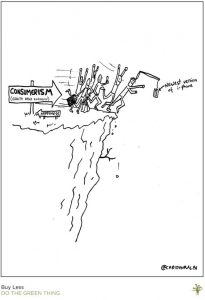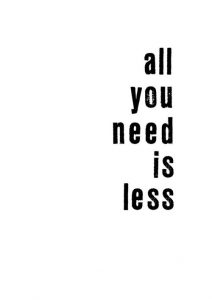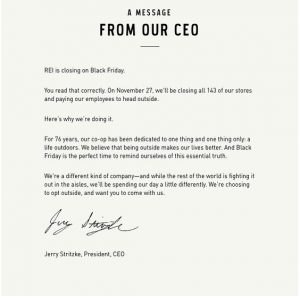Just a few days after COP27 concluded with the urgent appeal for immediate climate action, many companies have now committed to net zero pledges to decarbonize their businesses. Yet participation in a day that is all about promoting impulse purchases, thereby increasing overconsumption, stands in stark contrast to our climate reality. The necessary shift towards a sustainable future requires a rethinking of our consumerist lifestyle, moving our focus from acquiring unlimited amounts of low-quality products, toward mindful consumption of high-quality, fair, and environmentally friendly produced products – in short, the polar opposite of what Black Friday stands for.
How did Black Friday start?
Black Friday historically is the name of the Friday after Thanksgiving to describe the crowds and traffic congestion accompanying the start of America’s Christmas shopping season. It has been around for decades and grew into a worldwide madness. Sale prices have never been so low as on Black Friday. Of which you can question; how fair are these prices? Can it actually be produced for the prices it is sold? How many extra carbon dioxide emissions are generated due to the travel miles to deliver the crazy amount of packages? And so on… In our eyes, Black Friday is a black day in consumer society.
Don’t get us wrong, we support the Christmas thought of giving to show gratitude, love, and peace. However, the commercial thought and the urge to buy cheap stuff we don’t need goes way beyond our comprehension. If you think about it, isn’t it insane?
At Linky Innovation this is a very good reason to not participate in the madness of Black Friday (and other commercial days).
Why is Black Friday bad for the environment?
 Similar to fast fashion, Black Friday promotes mass consumerism and encourages people to buy products purely because they’re on sale with little regard for how often they will be used.
Similar to fast fashion, Black Friday promotes mass consumerism and encourages people to buy products purely because they’re on sale with little regard for how often they will be used.
Most products will be used a handful of times and then discarded – with the majority ending up in a landfill.
Whatsmore, millions of tonnes of resources required to manufacture and ship these products are used up during the black Friday sales.
And with return shipping for products no longer wanted, even more emissions from transporting these goods occur.
Logistics company Optoro found that returning items bought during the sales used over 1.2 billion gallons of diesel and emits 12 million metric tonnes of CO2. That was just in the US alone.
Black Friday waste facts and statistics
- 80% of products bought at Black Friday end up in landfill, are incinerated or are recycled poorly – source
- Only 29% of electronic waste caused by Black Friday is recycled
- This year’s (2022) Black Friday is expected to produce 429,000 metric tonnes of greenhouse gas emissions from product deliveries alone – that’s the same as 435 return flights from London to New York!
- 1.4 million tonnes of e-waste is sent to landfills every year
- UK shoppers spent £4.8 billion in last year’s Black Friday but this is expected to drop by 18% in 2022 due to the cost of living crisis
This is our Earth, and we encourage customers to shop consciously with brands that offer products and garments that will not only last but have been made ethically and sustainably. As a consumer, you choose who you support when you hand your money over to businesses… just be sure it’s the right business you choose to support.
You hold the power as a consumer in the growth of companies. The more sales they generate, the larger they grow but do they do the right thing as they grow? Do workers suffer as they grow? Do they produce excess products that pollute the planet as they grow?
Say no to the culture of overconsumption perpetuated by #BlackFriday sales, and remember we have power as consumers to push for positive change with more than just our spending 🖤
Find out more and get involved: https://t.co/EkvukYmfZC pic.twitter.com/nMqVI1NBh6
— Fashion Revolution (@Fash_Rev) November 11, 2021
Check out a few examples of 5 Brands, like Patagonia and REI, that rejected the usual tactics of Black Friday – they represent a great source of inspiration for us.

WHY WE DON’T DO BLACK FRIDAY
We fully support offering small discounts at this time of year for consumers who otherwise wouldn’t be able to afford our product. We know this as a fact, as we have a small base of customers that tell us they love our products but can only afford to buy them when we offer discounts. This is totally understandable and we fully support customers that need our products but don’t necessarily have the budget. We’re grateful for their support and custom.
Linky may be priced higher than other companies because our workers are paid a good wage and we design our skateboards in-house. For an electric skateboard, we are priced extremely fairly, because we want our customers to have sustainable, quality products at fair prices. Our designs are our own and are not mass-produced.
Time, love, research, and care go into our product. We only ever produce our skateboards in quantities we know will sell. There is never any waste or excess and it’s something we’re proud of as a company. We offer our customers quality and a skateboard that we know will last them for years to come and our prices reflect this. We got you.
As a business, we appreciate holiday shopping, but we feel the excess around Black Friday has shifted the focus from quality to quantity – and that’s simply not what we’re about.
That’s why we’re not offering Black Friday sales.
It doesn’t reflect who we are as a brand and diminishes the effort each person places into handcrafting every single item. By offering crazy discounts for sales, we would be devaluing the effort our team put in daily.
Our goal is – and always will be – to offer people a sustainable means of transportation, helping the reduction of CO2 emissions.
So as ever, if you share our sentiments, your support is forever appreciated and our product will be available on our online store.
But we won’t pressure you into making a decision – today, Friday, or ever.




